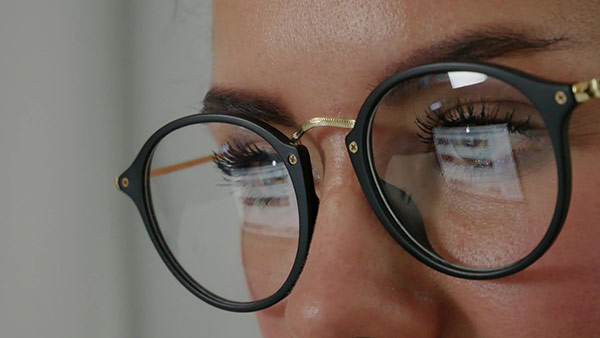COVID-19 has been a fixture of our lives for almost a year now, dominating TV news coverage as well as our day-to-day decision making: where we go, what we do, and who we do it with. Amazingly, there’s still a lot we don’t know about this virus; while primarily a respiratory illness, the effects on other systems of the body have been a hot topic of study, including the eyes.
While much research is still ongoing, we break down what we know so far in the blog post below.

What We Know About COVID-19 & the Eyes (So Far)
Can COVID-19 be contracted via the eyes?
COVID-19 is primarily transmitted through the respiratory droplets released when an infected person talks, coughs, or sneezes. That said, that’s no excuse to not wash your hands, use hand sanitizer, and otherwise practice good hygiene. The truth is that COVID-19 can still be contracted through the eyes as it would your mouth or nose. One possible mode of transmission is touching a surface that has the virus on it, then touching your eyes immediately afterwards.
If one is infected, can they spread COVID-19 through their tears?
As strange is it may sound, a person with coronavirus can indeed spread the virus through their tears, but the chances of transmitting the virus this way is relatively low. One determinant for eyes as a point of transmission is the infected individual’s symptoms: in some COVID patients, conjunctivitis (“pink eye”) can develop, but this is rare and typically affects only 1-3% of those infected. However, it does make transmission through tears more likely.
Will my eyeglases protect me from coronavirus?
The answer is: Not really, but it’s complicated. Glasses are not a substitute for goggles, face shields, or other personal protective equipment. However, contact lens wearers experience more irritation and touch their eyes far more often, making them more likely to contract the virus. Because glasses can act as a barrier between your hands and face, switching to glasses for a while isn’t a bad idea.

What kind of ocular complications can occur if I contract coronavirus?
As mentioned previously, one can develop conjunctivitis as a result of the coronavirus infection, but this is an uncommon symptom of the disease. If you develop conjunctivitis, you may experience itchiness, irritation, and some discharge. It’s important to note that many people experience conjunctivitis every year without contracting COVID-19, so don’t panic! It could be the result of a bacterial infection or even just allergens and irritants in the environment.
The Bottom Line
While a link between serious ocular disease and COVID-19 is yet to be determined, studies are still ongoing. With cases rising, proper precautions still need to be taken: remember to wear a mask, socially distance, and avoid touching your face!